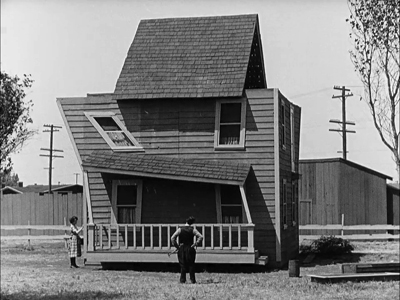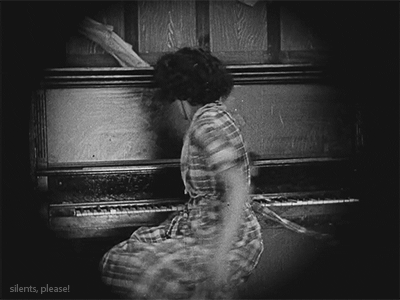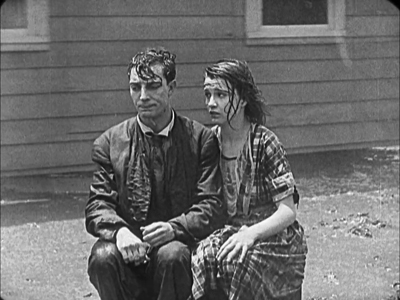One Week of 1920 is one of my favourite Buster Keaton shorts; it’s the one I show to friends as a gateway drug to silent cinema. Keaton’s first foray into solo film-making, it shows him at the height of his powers – perfectly paced and constructed, lifting slapstick comedy into the realm of elegance. It’s also a classic example of Keaton’s film persona: a man at the mercy of an often-chaotic world. One Week is the story of two newlyweds, their attempt to make a home together – literally – and their subsequent realization that a house is not always a home, and in fact, in this case, it may be an impossibility. Keaton costars with Sybil Seely, but every time I rewatch the film, I am struck by how above all, One Week is the story of a house with a life of its own – it is the building itself that really functions as the main character. So rather than talk about Keaton’s artistry and comedic accomplishment (fantastic, but that’s a well-worn topic), and assuming that most readers will already have seen the film – I’ll consider One Week via this strange dwelling, the seven-day house.
– – –
Mimicking advertising films, each new day is signaled by a shot of a tear-off calendar. Monday is the wedding, and foreshadowing things to come, a wonderfully cynical intertitle tells us: “The wedding bells have such a sweet sound but such a sour echo.” A wild ride later, the bride and the groom arrive at their new lot to find their wedding present from Uncle Mike: a kitset house. Building your own home is how everyone dreams of spending their honeymoon, no?
House status: Embryonic; dreaming of construction.
– – –
The couple start to construct the house in earnest on Tuesday. However, fate has a trick up its sleeve in the form of the nefarious Handy Hank (“the man she turned down”), who changes around the numbers on the house-crates. Yet even before that, there are signs that the bride and groom are not the DIY geniuses that one might hope; we see Buster Keaton’s character saw himself off a plank (the result: a classic Keaton tumble). Still, even if things are going awry, it is happening with perfect grace, as when the wall becomes a giant pivot:
And this iconic shot, repeated later to greater fame in Steamboat Bill, Jr. (1928):
House status: Balletic. Why walk, when you can dance?
– – –
As Wednesday dawns, the house at No. 99 has taken on what one might describe as a Cubist appearance.
Despite the railing doubling as a ladder, a peaceful coexistence between dwelling and newlyweds does not seem likely. A piano crushes the husband, crushes the ceiling (via rope-pulley), and crushes the floor. The garnish on this defiant piano: the sheet-music for The End of a Perfect Day.
House status: Mischievous. The house may be giving the husband and wife a headache, but it’s Handy Hank who ends up with his head through the roof.
– – –
The trials continue with the case of the under-carpet jacket, chimney shenanigans, a door to nowhere, and this bathroom scene played to perfection by Sybil Seely:
House status: Unruly … and a little bit saucy.
– – –
This inauspicious Friday sees the couple welcome guests to their home for a housewarming party. The doorway to nowhere comes in handy as Hank, in pursuit of the husband, hurtles through the portal, down to the ground, and into the fence. But when a heavy rainstorm appears, the umbrella Keaton’s character produces is a powerless defense. The whole building begins to rotate at high speed, leaving the guests scrambling for footing as they whirl around the rooms, and eventually ejecting everyone onto the muddy ground. It’s one of the big set pieces of the film, and what a set: evidently the whole house (not a model) was built on a turn-table. Incredible!
House status: Uncontrollable and delinquent (the teenage years?)
– – –
After the storm, No. 99 is displaying I believe the French call une façade à la zigzag.
It is then, collapsed in front of their busted abode, that the newlyweds discover that they are, in fact, on the wrong lot. It’s meant to be No. 66 where they are living! A new phase of metamorphosis: the house gains wheels, in the form of barrels.
House status: Decrepit and displaced – a tube of black lipstick away from its goth phase.
– – –
The next day is the continuation of the move, which is proving difficult. The husband nails his car to the building after the rope breaks, but the house is not tricked into thinking it is vehicular so easily:
The couple have managed to move the house partway over the train-tracks, when they hear a railroad signal sound and realize their location:
Luckily, the train passes by on the neighbouring track. Crisis averted! But then (spoiler cut):
House status: Boom! Destroyed. The perfect and inevitable conclusion.
– – –
Stray thoughts
- Sybil Seely is great as Keaton’s leading lady, isn’t she? Charming and fun, and not overselling anything. Incidentally, the bathroom scene is mentioned obliquely in a review in the Film Daily of 31 October 1920: “There is a spicy touch to one scene, but that is inoffensive and perfectly clean.” An intentional choice of words there, I’m sure!
- It appears that the name of the actor who played Handy Hank is unknown. How could this be? A pantomime villain for our time! Give this guy a spinoff already.
- Speaking of which, it seems like asking for trouble to invite your rejected suitor to be your wedding driver and also come to a party at your house … but maybe that’s just me.
I’ve sketched here the progress of the house on lot No. 99, from genesis to catastrophe – I find it fascinating how the structure and nature of the building keeps changing throughout the film, and how Keaton engineers this and plays off it. A seemingly simple premise is given great humour and elegance. But as they say, the proof of the pudding is in the eating, and I have to think that my inept description – ah, the difficulty of writing about comedy! – is a poor recipe. So if you haven’t seen One Week before, or if you have, go forth and enjoy this gem of a film from the wonderful Buster Keaton.
– – –
One Week. Dir. Edward F. Cline & Buster Keaton. USA: Joseph M. Schenk/Metro Pictures, 1920.
This post is my contribution to the First Annual Buster Keaton blogathon, hosted by Lea at Silent-ology. Read all the entries here!


























Pingback: The First Annual Buster Keaton Blogathon | Silent-ology
A great analysis, and unique too! Not everyone would take the time to look at the house’s perspective. ;-) I’m completely with you on calling One Week the gateway drug to the silent era (I’ve described it like that myself, believe it or not)–it’s a perfect introduction indeed. Thank you so much for joining the blogathon!
LikeLike
Glad you enjoyed! It’s such a great conceit, and Buster just keeps pushing it further and further. And thank you for hosting the event! :)
LikeLiked by 1 person
I love this movie. Just when you think they have made it safely at the end – another train comes. Great post!
LikeLike
It’s just a fantastic one-two punch! Thanks Michele :)
LikeLike
Don’t call yours an inept description. You did a nice job from a unique perspective. Thank you for sharing it with us all.
LikeLike
Thank you, Joe :)
LikeLike
Wonderful! Indeed, the house IS the star of on week. I loved how you described its “Cubist” phase.
Don’t forget to read my contribution to the blogathon! :)
Cheers!
http://www.criticaretro.blogspot.com.br/2015/02/keaton-fala.html
LikeLike
It’s the house Picasso dreamed of :)
LikeLike
Great minds review alike ;) Even just watching the gifs made me smile. Handy Hank is a great addition to this short, shame that so many of these early actors (pioneers if you like!) have been lost.
LikeLike
Indeed! ;) And Handy Hank is just such great fun. I love the part when Buster and Sybil are trying to kiss in the wedding car and Hank keeps turning around and interrupting them.
LikeLike
Pingback: Watching Buster Keaton’s ‘One Week’ - PIRAN CAFÉ
Hi! I surfed in via Silent Movie GIFs on Twitter *waves* Someone linked your fabulous article in a comment. Buster Keaton is my all-time favorite actor, silent era or otherwise. Regarding Handy Hank, I believe he was played by Al St. John, Roscoe Arbuckle’s nephew. In fact, I’m 99% certain of it, but I can’t find his name in any credits for it. WEIRD. Anyway, glad I found your blog. Love it! Thank you!
LikeLiked by 1 person
Hi gaminette (great name!), lovely to hear from you. :) I agree, Buster is so uniquely talented. Al St. John is a very good candidate for Handy Hank! I wonder if any of the Keaton bios confirm the actor’s identity – anyway, let me know if you find conclusive proof!
LikeLike
I just saw the clip of Handy Hank painting the number, and thought it was Al St. John, and googling brought me here. Add me to the roll of those who think it looks just like him in that shot. Compare to how he looks in those Keaton-Arbuckle shorts.
LikeLike
He’s a likely candidate, I agree! But I’d probably need to do a bunch of rewatching to be 100% on the visual match.
Thanks for the comment :)
LikeLike
Which typeface they used for this movie???
LikeLike
I’m sorry, I don’t know!
LikeLike